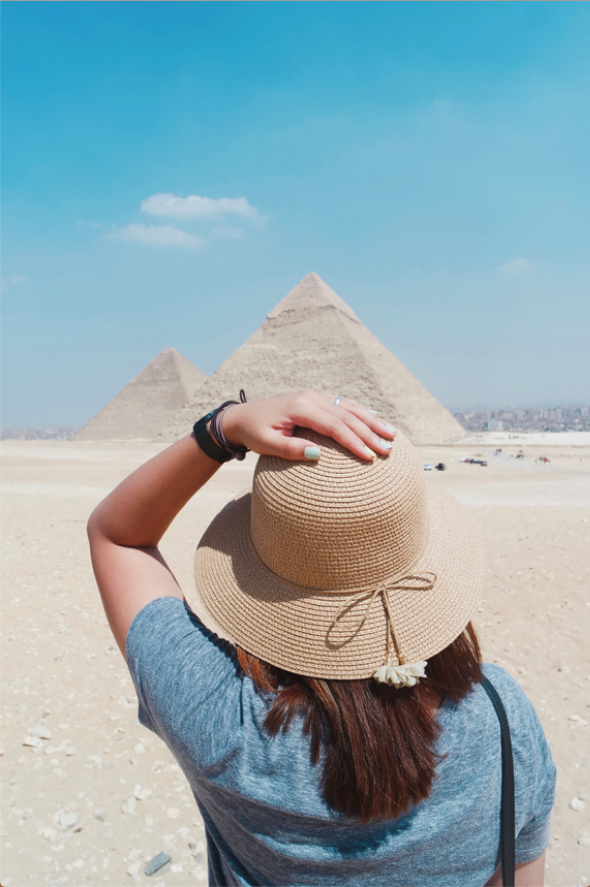
International travel may be on hold for the time being but there's nothing to stop you planning your first post-coronavirus getaway to enjoy once normality resumes.
And, as many people have more time on their hands than normal, now could be the perfect time to do some research and get ready for your next trip abroad.
If you haven't yet decided where you want to go once borders reopen, why not consider Egypt.
Egypt, with its fascinating history and culture, is a top destination for anyone with a sense of adventure and will certainly offer a welcome change after months spent at home or in the local area.
Home to the Great Pyramid of Giza, the only one of the 7 Wonders of the World which is still standing today, Egypt is a bucket-list destination for many. Make sure you prepare your trip well in order to get the most out of your time in Egypt, and to travel the country safely.
Apply for a Visa for Egypt Online
The first essential step when planning an Egyptian adventure is to check the nation's visa requirements. The majority of travelers need a visa for Egypt and, in many cases, it can be obtained easily online
The electronic platform was introduced to make applying for a visa to go to Egypt easier. The eVisa process is fully online with no need to present paperwork in person at an embassy or consulate or join long lines at the airport on arrival.
To get an eVisa for Egypt your passport needs to be valid for at least 6 months from the arrival date so bear this in mind and check the expiry date of your travel document.
Once the eVisa has been approved, you'll receive a copy by email.
In addition to obtaining the correct visa, there are several other things to consider to ensure a safe and hassle-free stay.
Food and Drink Safety in Egypt
To stop an upset stomach from ruining your holiday, make sure you follow the food and water safety guidelines for Egypt.
Firstly, only eat food which has been cooked thoroughly, in particular meat and fish. It's sensible to avoid unpasteurized milk and cheese too.
Take particular care when buying food from street vendors and only do so where there is a running water supply.
Peel all fruit and vegetables, unless you have washed them thoroughly yourself. Also, don't eat food which has been left uncovered for a long time.
Is it safe to drink tap water in Egypt?
When traveling in Egypt it's advisable to drink only bottled water. Whilst tap water in some areas may be safe, it's best to avoid it completely to prevent illness.
Ask for drinks to be served without ice and ensure hot drinks are prepared with bottled water. If bottled water is not available, always boil the tap water before consumption, it's a good idea to take some water purification tablets with you too.
Vaccinations Required to Travel to Egypt
The World Health Organisation recommends that anyone visiting Egypt gets certain vaccines prior to travel. Check which of the following vaccines are necessary in your case with a medical professional:
Hepatitis A (recommended for all visitors) & B
Typhoid: check whether you have had the vaccine recently
Yellow fever: spread by mosquitoes, depending on the area you are visiting this may or may not be necessary
Rabies: there are many stray dogs in Egypt which might be carrying this disease, avoid contact with animals when in the country
You should also be up to date with several routine vaccinations such as MMR and influenza. Make sure you take insect repellent with you or buy it on arrival, to keep bugs at bay.
Other Health and Safety Considerations in Egypt
Egypt is a hot country with average daily temperatures ranging from 57 ºF (14 ºC) in January to 83 ºF (28 ºC) in July.
Due to Egypt's climate, you'll want to time your trip carefully depending on your travel plans. Whilst summer may be a good season to visit Red Sea and Sinai resorts, such high temperatures are not ideal for exploring the pyramids.
Prepare for the heat by packing light, loose-fitting clothing made from breathable materials such as cotton and linen. You'll also need a hat and sunglasses plus high-factor sunscreen which should be reapplied frequently.
Remember that temperatures in the desert drop dramatically once night falls, so make sure you have some items of warmer clothing to put on in the evening, especially if you're planning to go on a popular Sahara Desert excursion.








